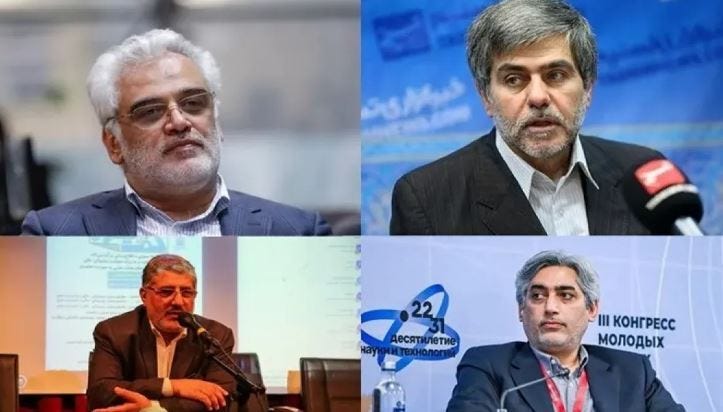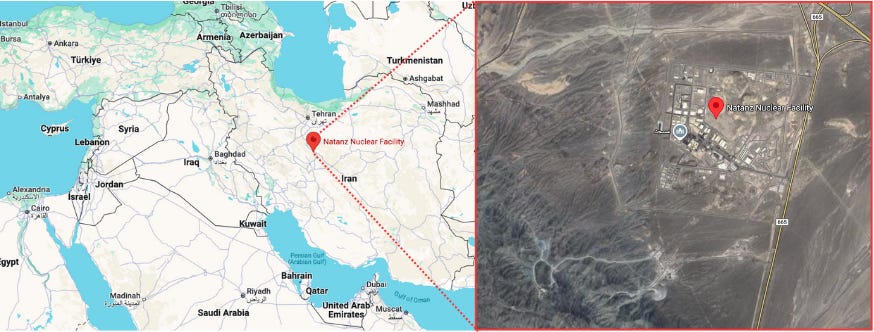Situation Report: Operation Rising Lion - Israel Targets Iran
On June 13 Israel launched the first salvos of an expected multi-day campaign to cripple Iran's nuclear program. Initial Israeli strikes killed top Iranian military officials and nuclear scientists.
Overnight on June 13, the Israeli military launched a massive series of air strikes against Iran. The Israeli strikes are expected to be the first wave in a multi-day campaign to neutralize Iran’s nuclear program named "Operation Rising Lion.” The attacks have already resulted in significant blows to the leadership of the Iranian military and nuclear research programs. The prospects of the campaign halting Iran’s nuclear program over the long-term are unclear. Iran has vowed to retaliate against both Israel and the US.
OVERVIEW:
Operation Rising Lion kicked off overnight on June 13 with over 200 Israeli warplanes striking as many as 100 targets in the Iranian capital of Tehran, as well as the cities of Tabriz, Natanz, Isfahan, Kermanshah, and Arak.
Battle damage from the first waves of Israeli air strikes is still being assessed, but the choice of targets and reported casualties suggests the Israeli military has targeted both the infrastructure and leaders of the Iranian nuclear program and top officials of the Iranian Revolutionary Guard Corps (IRGC).
Iran Reports Deaths of Top Military Commanders and Nuclear Scientists
Iran’s state media confirmed that Israeli air strikes killed at least three top officials of the Iranian Revolutionary Guard Corps. The deaths included General Hossein Salami, the Commander-in-Chief of the IRGC; Major General Mohammad Bagheri, the Chief of Staff of Iran’s Armed Forces (comparable to the US’s Chairman of the Joint Chiefs of Staff); Major General Gholam Ali Rashid, the commander of the Khatam al-Anbiya Central Headquarters (equivalent to a theatre commander for the US).
Iran also announced the deaths of six leading nuclear researchers. These included Mohammad Mehdi Tehranchi (President of Islamic Azad University); Fereydoun Abbasi (former head of Atomic Energy Organization of Iran); Seyyed Amir Hossein Faqhi; Abdolhamid Minouchehr (faculty member at Shahid Beheshti University); Ahmad Reza Zolfaghari (professor of Nuclear Engineering Shahid Beheshti University); and Motabli Zadeh.
Dr. Abbasi, who previously led the Atomic Energy Organization of Iran, had made several recent statements advocating the enrichment of weapons grade uranium, and the development of nuclear weapons.

Iran Reports Nuclear Sites Struck
Iranian state media reported that the Israeli military struck the Shahid Ahmadi Roshan nuclear site (also known as the Natanz nuclear site) in Isfahan province with at least two waves of air strikes.

Iran has not confirmed that other nuclear sites have been targeted.
US Provides Ambiguous Response to Israeli Strikes
The US issued a series of official statements leading up to and following the Israeli strikes that signal a willingness to defend Israel from reprisals, while distancing the US from the decision to launch the attacks, and suggesting that it will not provide support for offensive operations.
In a Truth Social post as the attacks were unfolding, President Donald Trump announced:
“We remain committed to a Diplomatic Resolution to the Iran Nuclear Issue! My entire Administration has been directed to negotiate with Iran. They could be a Great Country, but they first must completely give up hopes of obtaining a Nuclear Weapon.”
Secretary of State Marco Rubio issued a statement warning Iran against attacking US interests:
“Tonight, Israel took unilateral action against Iran. We are not involved in strikes against Iran and our top priority is protecting American forces in the region. Israel advised us that they believe this action was necessary for its self-defense. President Trump and the Administration have taken all necessary steps to protect our forces and remain in close contact with our regional partners. Let me be clear: Iran should not target U.S. interests or personnel.”
House Speaker Mike Johnson, who is set to travel to Israel on June 22 to address a special session of the Knesset, also tweeted his support: “Israel IS right—and has a right—to defend itself!”
Iran Vows Revenge Against US and Israel
Spokesman for the Iranian Armed Forces Brigadier General Abolfazl Shekarchi warned that Iran planned a severe response for the attacks targeting both Israel and the US:
“Retaliation will be decisive, and the Zionist regime and the United States will pay a very heavy price.”
The Iranian Foreign Ministry issued a warning that the US would face reprisals for its support of Israel:
“The Zionist regime's aggressive actions against Iran could not have been carried out without the coordination and permission of the United States. Accordingly, the US government, as the main supporter of this regime, will also be responsible for the dangerous effects and consequences of the Zionist regime's adventurism.
Iran Launches Initial Response With Drones
Israel reported that it was tracking at least 100 Iranian drones launched in the immediate aftermath of the attacks.
BIGGER PICTURE: THE ROAD TO WAR
A confluence of factors likely led Israel to seize the moment to strike Iran’s nuclear program. These include stalled nuclear negotiations between the US and Iran, recent reports suggesting Iran is stockpiling weapons-grade uranium, as well as favorable military conditions such as weakened Iranian air defenses and proxy groups.
1. Stalled Negotiations
Negotiations between the US and Iran over its nuclear program reached an impasse after four rounds of talks in Oman. The decisive moment derailing progress appears to be Ayatollah Khamenei’s rejection of a “compromise” proposal put forward by the Trump administration in early June that would allow Iran some “interim” uranium enrichment.1 Trump announced in an appearance on Miranda Devine’s podcast “Pod Force One” shortly after the offer was rejected that he was no longer confident a deal could be reached with Iran to end its nuclear program and avoid conflict.
2. International Atomic Energy Agency Reporting on Iranian Nuclear Violations
The International Atomic Energy Agency (IAEA) issued a report on May 31 accusing Iran of conducting a much larger and more aggressive program of nuclear enrichment than it has publicly acknowledged. The report concluded that Iran engaged in years of undeclared enrichment of uranium to levels that exceeded any civilian purposes. IAEA Director General Rafael Grossi suggested that Iran had stockpiled 400 kg of highly enriched uranium, enough to produce ten nuclear warheads.
The IAEA Board of Governors voted on June 12 to declare that Iran had violated its obligations as a signatory of the nuclear nonproliferation treaty (NPT). Israel launched "Operation Rising Lion hours after the vote.
3. Degraded Iranian Air Defenses
Israeli strikes on Iran in April and October 2024 crippled key Iranian air defense systems. A November 2024 report by The Institute for the Study of War suggested that the previous attacks would leave Iran vulnerable to future Israeli strikes on its nuclear program. Iran's vulnerability stemmed in part from difficulty sourcing replacements for its destroyed Russian-made systems, due to the ongoing war in Ukraine depleting the Kremlin’s inventory.
4. Diminished Iranian Proxy Groups
Iran’s capacity to attack Israel through its regional proxy groups has also been severely curtailed due to Israeli campaigns against Hamas in Gaza and Hezbollah in Lebanon, joint US-Israeli strikes on the Houthis, and the toppling of the friendly Assad regime in Syria.
IMPLICATIONS:
Iran Ignored US Signals Warning of Impending Conflict
Israeli air strikes follow several clear signals that the US was preparing for an impending battle with Iran. The US redirected thousands of specialized missile interceptors for drones from Ukraine to the Middle East in early June, after Iran rejected the Trump administration’s compromise deal. The US began evacuations of government employees and embassy staff in Iraq and the Gulf Arab states in the days that followed. Finally, the US imposed restrictions on the activities of its embassy staff in Israel on June 12.
Some reports suggest that US leaders had hoped the moves would convince Iran to drop its hardline stance and offer concessions in negotiations. It is not clear if Iranian leaders understood these signals as credible threats or if they felt that they could not back down. The latter scenario seems more likely. Days earlier, Ayatollah Khamenei issued a defiant speech to the Iranian Parliament, during Eid al-Ghadir celebrations, to urge lawmakers to preserve the Iranian Revolution and resist being bullied by the US.
Iran Will Try to Respond with Asymmetric Force
Iran’s previous responses to Israeli attacks have consisted of mass long-range strikes on Israeli cities by drones and ballistic missiles. Iranian retaliatory attacks on Israel in April and October 2024 were largely intercepted and did not cause significant damage. As a result, we should expect Iran to try something new. While Iran will launch salvos of long-range drone and missile systems at Israel, it may also attempt a broader attack on both American and Israeli interests throughout the Middle East. This may include renewed attacks by the Houthis on Israel and American military units, terrorist attacks on American and Israeli citizens overseas, and cyber attacks targeting American and Israeli companies or critical infrastructure.
Iran May Make a Break For a Nuclear Weapon
While Israeli strikes may temporarily set Iran back from immediately developing a nuclear weapon, there are several reasons why they are unlikely to present a long-term hurdle to their creation. First, Iran has already stockpiled enough enriched uranium to produce several nuclear weapons, and the current strikes are not likely to completely destroy it all. Second, elements of Iran’s nuclear program are buried deeper underground than Israel can reach without the assistance of American bombers or its own nuclear weapons. Third, Iran’s indigenous nuclear research program is likely advanced enough to recover on its own from any serious damage to its operations or facilities.
Rather than halt a slow, steady push for a nuclear weapon, the attacks may prompt Iran to more rapidly produce fissile material and nuclear capable warheads in deeply buried research facilities. Iranian leaders may conclude that Israel and the US have fully committed to spurring regime change and that nuclear weapons are needed to preserve the Iranian Revolution.
Decisive moment viewed from the US perspective.




